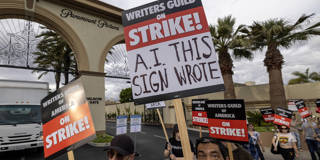All knowledge workers should hope that striking Hollywood writers succeed in preventing studios from automating much of the work they do. While AI could become a powerful tool for augmenting human creativity and driving widely shared prosperity, that will not happen unless workers have a say in how it is used.
BOSTON – Artificial intelligence is big business’s new flavor of the month. Companies are rushing to showcase how they will be using new generative AI models, and the media is full of stories about the technology’s transformative potential. There is no denying that it could significantly increase productivity. But who stands to benefit? The ongoing Writers Guild of America (WGA) strike may offer an answer.
Hollywood screenwriters are confronting a future that all knowledge workers will soon face – and without the benefit of union representation. At issue is how AI will be used, and by whom. Will TV and movie producers see AI as a way to replace writers and cut costs, or will they use it to create higher-quality content, empowering creative workers to be more productive and earn higher incomes?
We have been down a similar road before. In the early twentieth century, rapid improvements in manufacturing technologies such as moving assembly lines and electrical machinery led to a sharp increase in productivity. Henry Ford, a pioneer in applying these technologies, estimated that motor-enabled machinery “alone has probably doubled the efficiency of industry,” while also making it possible to build much larger factories. But workers did not automatically share in these gains. On the contrary, that did not happen until new tasks had been created, and until workers had acquired enough bargaining power to demand higher wages. These are the two pillars of shared prosperity.

BOSTON – Artificial intelligence is big business’s new flavor of the month. Companies are rushing to showcase how they will be using new generative AI models, and the media is full of stories about the technology’s transformative potential. There is no denying that it could significantly increase productivity. But who stands to benefit? The ongoing Writers Guild of America (WGA) strike may offer an answer.
Hollywood screenwriters are confronting a future that all knowledge workers will soon face – and without the benefit of union representation. At issue is how AI will be used, and by whom. Will TV and movie producers see AI as a way to replace writers and cut costs, or will they use it to create higher-quality content, empowering creative workers to be more productive and earn higher incomes?
We have been down a similar road before. In the early twentieth century, rapid improvements in manufacturing technologies such as moving assembly lines and electrical machinery led to a sharp increase in productivity. Henry Ford, a pioneer in applying these technologies, estimated that motor-enabled machinery “alone has probably doubled the efficiency of industry,” while also making it possible to build much larger factories. But workers did not automatically share in these gains. On the contrary, that did not happen until new tasks had been created, and until workers had acquired enough bargaining power to demand higher wages. These are the two pillars of shared prosperity.